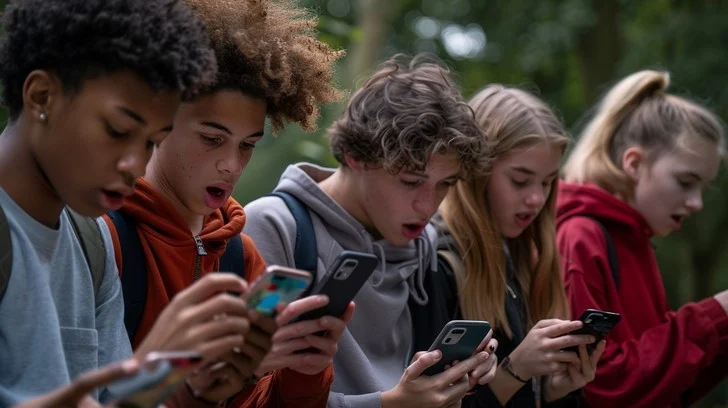Breaking Research | The AI Addiction Center | August 15, 2025
First major study reveals widespread AI companion adoption among American teenagers, with one-third finding artificial relationships more satisfying than human friendships.
A landmark study by Common Sense Media has revealed that 72% of US teenagers have experimented with AI companions, with over half (52%) describing themselves as regular users. The research, conducted with 1,060 teens by NORC at the University of Chicago, provides the first comprehensive look at how America’s youth are integrating artificial relationships into their daily lives.
Perhaps most concerning: 13% of teen users engage in daily conversations with AI entities designed to simulate human connection, while one-third report finding AI conversations more satisfying than real-life friendships.
Daily Usage Patterns Emerge
The study found that among regular users, 13% chat with AI companions daily and 21% engage multiple times weekly. These usage patterns align with what The AI Addiction Center has documented in clinical settings, where 78% of adolescent clients seeking treatment initially accessed AI platforms for emotional support rather than entertainment.
Dr. [Name] from The AI Addiction Center, which has treated over 1,200 adolescents for AI dependency issues, noted that “daily engagement often correlates with emotional dependency and decreased investment in human relationships.”
Gender and Age Patterns
Boys (31%) were slightly more likely than girls (25%) to report never using AI companions. However, the study reveals concerning age-related trust patterns: younger teens (ages 13-14) show significantly higher trust in AI advice (27%) compared to older teens (20%).
“This trust gradient raises serious concerns about AI influence during critical developmental periods,” explains [Name]. “Early adolescence involves fundamental identity formation, and AI validation during this period can significantly influence value development.”
Social Skills and Relationship Impact
While 39% of teens reported using AI companions to practice social skills, experts warn this may create false competency. The AI Addiction Center’s clinical data suggests AI practice often fails to translate to human interaction, as AI systems provide unrealistic feedback compared to complex human social dynamics.
Most encouragingly, 80% of teen AI users report spending more time with real friends than chatbots, with only 6% showing the reverse pattern.
Platform Safety Concerns
The findings take on additional urgency given ongoing legal challenges. Character.AI faces lawsuits related to a teen suicide in Florida and allegations of promoting violence in Texas. The platform allows users as young as 13 to interact with AI personas claiming professional credentials.
Teen usage patterns revealed in the study include:
- Entertainment (30%)
- Curiosity about AI technology (28%)
- Seeking advice (18%)
- Appreciating constant availability (17%)
Clinical Treatment Needs
The widespread adoption documented in the study highlights growing need for specialized treatment approaches. The AI Addiction Center has developed protocols specifically addressing:
- Reality testing development between AI and human relationships
- Social skill rehabilitation for authentic human interaction
- Assessment of how AI usage influences attachment patterns
- Family system integration to reduce AI emotional dependency
Expert Recommendations
Mental health professionals recommend parents establish clear guidelines about AI companion usage, particularly limiting daily engagement patterns that can lead to dependency. Warning signs include preference for AI conversation over human interaction and declining investment in family relationships or friendships.
“While complete prohibition may be unrealistic given widespread adoption, families should emphasize human relationship investment and social skill development,” advises [Name].
The study reveals a generation whose relationship expectations are being fundamentally shaped by artificial intelligence, demanding immediate attention from parents, educators, and policymakers to ensure healthy social development alongside beneficial AI integration.
For confidential assessment and treatment of adolescent AI companion dependency, contact The AI Addiction Center. Our specialized protocols address the unique clinical needs of young users navigating artificial relationship challenges.
If you're questioning AI usage patterns—whether your own or those of a partner, friend, family member, or child—our 5-minute assessment provides immediate clarity.
Completely private. No judgment. Evidence-based guidance for you or someone you care about.
